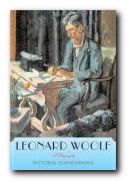politics, life, and literature – 1880 to 1969
Leonard Woolf is probably best known as the husband of Virginia Woolf, but in fact he had a remarkable life and set of achievements quite apart from his wife. He was a political activist and one of the founders of the League of Nations (which became the United Nations); he was a novelist and a journalist; and throughout the whole of his adult life he was a professional publisher, in charge of the very successful Hogarth Press, which he founded and ran successfully for fifty years.
 The first volume of his autobiography deals with his childhood in a prosperous upper middle-class Jewish family and his early memories of growing up in late Victorian London, then his intellectual flowering when he went to Cambridge. The are some wonderful character sketches of his contemporaries, who became luminaries of the Bloomsbury Group, including Saxon Sydney Turner, Lytton Strachey, and Clive Bell.
The first volume of his autobiography deals with his childhood in a prosperous upper middle-class Jewish family and his early memories of growing up in late Victorian London, then his intellectual flowering when he went to Cambridge. The are some wonderful character sketches of his contemporaries, who became luminaries of the Bloomsbury Group, including Saxon Sydney Turner, Lytton Strachey, and Clive Bell.
You also get full details of all the property leases and house buyings of this group as it established its regular system of one place in town and another in the countryside. Some of his more inspired passages are his tirades against mysticism, religious belief, and any surrender to irrationalism. He has a seductively convincing underpinning to his philosophic position that Nothing matters, which he interprets in a non-passive manner – no doubt his own brand of G.E.Moore’s ethics, which he absorbed at Cambridge along with the rest of the Apostles.
Occasionally he’s quite humorous, and he is certainly a humane, rational, and honest man; yet he seems slightly naive in claiming that money is not really important – a claim contradicted by his obsessive habit of listing every penny he spent and earned throughout his fife. But these are minor human inconsistencies.
The next part (a whole volume in its original publication) deals with a part of his life of which most literary enthusiasts know nothing – his work as a colonial administrator in Ceylon. These pages include scenes you would not normally associate with this pillar of Bloomsbury: supervising floggings and executions; eliminating outbreaks of rinderpest; trekking through jungles; and issuing certificates for celebrity big game hunters.
He comes across as a thoroughly decent, intelligent, hard-working man, with a particularly sharp eye for the underdog and a love of animals which makes him an animal liberationist before his time. His experiences in Ceylon made him increasingly anti-imperialist, so he quit the service in 1911 and married Virginia Woolf instead.
He lived an astonishingly rich and varied life post 1912 (covered in Volume II) engagement with the co-operative movement, a gradual shift to the Left in political terms, and friendships with all the leading literary and political figures of the day – H.G.Wells, G.B.Shaw, Bertrand Russell, Ramsay MacDonald, and T.S.Eliot. There are also sustained portraits of Ottoline Morrell, Isobel Colefax, Sigmund Freud (whose complete works he published) and Ramsay MacDonald. He also provides an impassioned account of the political dark years of the 1930s.
Politically, he was a left-wing realist. He served on endless committees, fighting for causes in which he believed. Yet he realised that the people amongst whom he worked, and the mechanisms they pursued, were deadly boring. Unlike many fellow travellers of the inter-war years, he was also well aware that the communists (in Soviet terms) killed more people than they helped or saved.
He’s very revealing on the mechanics of running a small independent publishing company, and he presents the profits and balance sheets of the Hogarth Press with the very conscious aim of revealing what most other writers talk about but never confess – how much they make from their writing.
As an autobiography, it’s long overdue for a reissue, but in the meantime, the two volume Oxford Paperbacks edition offers the full text with good indexes. Leonard Woolf went up in my estimation as a result of reading this memoir, and I am looking forward now to both his collected leters, and in particular to the letters he exchanged on almost a daily basis with his ‘lover’ Trekkie Parsons.
© Roy Johnson 2000
![]() See volume two of this autobiography
See volume two of this autobiography
Leonard Woolf, An Autobiography: 1880-1911 v. 1, Oxford: Oxford Paperbacks, 1980, pp.320, ISBN: 0192812890
More on biography
More on Leonard Woolf
Twentieth century literature
More on the Bloomsbury Group